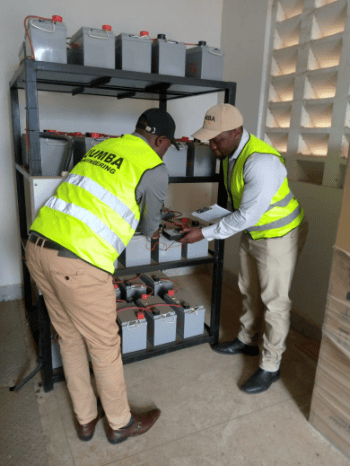Every project begins with a vision — a building, a power system, a solar farm — but before ground is broken or a cable is laid, there’s one critical step that determines success: safety planning through risk assessments.
At Jumba Engineering Services Ltd. (Jumba Engineering.), we have built our reputation on the principle that safety is not an expense; it’s an investment. For over 40 years, across projects ranging from commercial malls to power substations and solar plants, we have proven that structured risk assessment and safety controls not only save lives but also save clients millions in avoided losses.
What is a Risk Assessment?
A risk assessment is a systematic process of identifying hazards, evaluating risks, and implementing controls to minimize accidents and disruptions.
Key elements include:
Hazard Identification: spotting electrical, structural, or environmental risks.
Risk Evaluation: analyzing likelihood and severity.
Control Measures: implementing PPE, engineering controls, and administrative safeguards.
Monitoring & Review: ongoing checks to ensure risks remain under control.
Standards such as ISO 31010 (Risk Management Techniques) and OSHA 2007 (Kenya) provide frameworks for this process.
Why Safety Matters in Engineering
Engineering projects inherently carry risks: high voltages, heavy machinery, working at heights, and chemical exposure. Without proper safety controls, risks translate into:
Injuries and fatalities.
Project delays and cost overruns.
Legal penalties and shutdowns by NCA/OSHA.
Damaged client reputation and loss of trust.
By investing in risk assessments, clients achieve:
Compliance with EPRA, NCA, OSHA Kenya.
Financial savings by avoiding downtime and rework.
Long-term reliability of systems built in safe environments.
Jumba Engineering’s Safety-First Engineering Approach
Our safety methodology combines international best practices with practical field experience:
Pre-Construction Safety Audits
Site surveys to identify hazards.
Soil and structural analysis for excavation and load safety.
Design Stage Risk Analysis
Arc flash studies (IEEE 1584).
Relay coordination studies for protection systems.
Fault-current analysis for substation designs.
Implementation Phase
Toolbox talks before every work shift.
Mandatory PPE (helmets, insulated gloves, harnesses).
Safety supervisors on-site daily.
Monitoring & Maintenance
Annual safety inspections of electrical installations.
Emergency response training for client staff.
Updates as per changes in OSHA and IEC standards.
Case Study: Substation Works in Nairobi
In 2022, Jumba Engineering. was tasked with earthing and testing at a substation near Two Rivers Mall. The project posed risks due to high fault-current levels and confined spaces.
Our Actions:
Conducted arc flash analysis and issued appropriate PPE (Category 4 rated suits).
Applied lock-out/tag-out (LOTO) procedures to ensure worker safety.
Supervised continuous gas testing in underground vaults.
Results:
Zero accidents throughout the project.
System delivered within budget and timeline.
Client audit praised Jumba Engineering for exceeding OSHA 2007 standards.
Cost Savings Through Safety
It’s often assumed safety adds cost, but in reality:
Every KES 1 invested in safety saves up to KES 4–6 in avoided accidents, repairs, and delays.
Insurance premiums drop for clients who partner with ISO 45001–aligned contractors.
Reputation benefits: safe projects attract investors and long-term tenants.
Best Practices for Clients
Insist on a risk assessment report before project execution.
Confirm your contractor has ISO 45001 and OSHA compliance.
Budget for safety training and drills.
Involve your team in safety planning — it builds ownership.
Why Jumba Engineering Leads in Safety
40+ years of incident-free major projects.
Dedicated HSE officers at all active sites.
Compliance with ISO 45001, OSHA 2007, and IEC standards.
Proven safety record on high-profile projects: Garden City Mall, Kisumu Housing, Shalimar Farm Solar.
Conclusion
Risk assessments are not optional. They are the difference between projects that succeed safely and those that collapse under preventable accidents. At Jumba Engineering, we see safety as a moral duty, a financial advantage, and the true mark of professionalism.
📧 Contact us at jes@jesltd.co.ke or request a safety-driven project consultation via our Request a Quote page.

